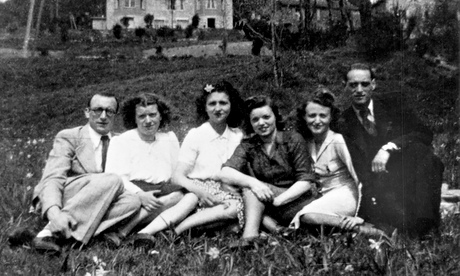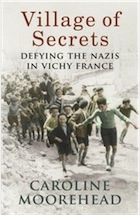A story of wartime bravery and resistance in which a French village helped 3,000 Jews to safety
Elizabeth Lowry - The Guardian,
A long history of dissent … villagers in Le Chambon. Photograph: The Chambon Foundation
Since the second world war, there has been intense debate in France about the nature of memory and history: how it is perceived, recorded and transmitted. The role played by the Vichy government in deporting over 75,000 Jews to concentration and extermination camps in the Third Reich remains the subject of agonised discussion; the extent to which the antisemitism of Philippe Pétain's administration was truly representative of a wider national mood is still unclear.
What is certain is that Vichy routinely offered more by way of identifying, targeting and interning its Jewish citizens than Germany asked for. No other European country adopted such a definite antisemitic stance: Denmark succeeded in spiriting away 93% of its Jewish population to safety in Sweden, Fascist Italy engaged in constructive delay; Hungary halted its deportations towards the end of the war. One SS officer remarked during his trial in 1947: "We found no difficulty with the Vichy government in implementing Jewish policy."
At the same time it was plain, even once reliable information about Hitler's "final solution" had been received by the allies, that none of the western allied powers was prepared to prioritise the saving of the Jews as a war aim. Their liberation was eventually achieved only as the result of military victory. That about three-quarters of the 330,000 Jews thought to be in France in 1940 did survive the Nazi extermination drive was mainly due to the behaviour of a number of ordinary French people who took the risk of sheltering them.Village of Secrets is the gripping reconstruction of one such "adventure in imagination and cooperation", which stands out from others of its kind in the sheer scale and audacity of its enterprise.
Set in the village of Le Chambon-sur-Lignon and its neighbouring parishes, high in the mountains of the eastern Massif Central,Caroline Moorehead's rigorously researched and well-balanced account relates how an isolated agricultural community not only managed to hide some 800 Jewish refugees, most of them children, but helped a further 3,000 to cross France's borders to safety in Switzerland – more, proportionately, than were rescued anywhere else in the country.
Note - NZ publication date 5 September -
Chatto & Windus $39.99


No comments:
Post a Comment